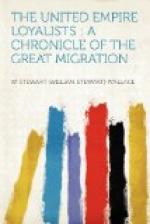Prince Edward Island was in 1783 owned by a number of large landed proprietors. When it became known that the British government intended to settle the Loyalists in Nova Scotia, these proprietors presented a petition to Lord North, declaring their desire to afford asylum to such as would settle on the island. To this end they offered to resign certain of their lands for colonization, on condition that the government abated the quit-rents. This petition was favourably received by the government, and a proclamation was issued promising lands to settlers in Prince Edward Island on terms similar to those granted to settlers in Nova Scotia and Quebec.
Encouraged by the liberal terms held forth, a number of Loyalists went to the island direct from New York, and a number went later from Shelburne, disappointed by the prospects there. In June 1784 a muster of Loyalists on the island was taken, which showed a total of about three hundred and eighty persons, and during the remainder of the year a couple of hundred went from Shelburne. At the end of 1784, therefore, it is safe to assume that there were nearly six hundred on the island, or about one-fifth of the total population.
These refugees found great difficulty in obtaining the grants of land promised to them. They were allowed to take up their residence on certain lands, being assured that their titles were secure; and then, after they had cleared the lands, erected buildings, planted orchards, and made other improvements, they were told that their titles lacked validity, and they were forced to move. Written title-deeds were withheld on every possible pretext, and when they were granted they were found to contain onerous conditions out of harmony with the promises made. The object of the proprietors, in inflicting these persecutions, seems to have been to force the settlers to become tenants instead of freeholders. Even Colonel Edmund Fanning, the Loyalist lieutenant-governor, was implicated in this conspiracy. Fanning was one of the proprietors in Township No. 50. The settlers in this township, being unable to obtain their grants, resolved to send a remonstrance to the British government, and chose as their representative one of their number who had known Lord Cornwallis during the war, hoping through him to obtain redress. This agent was on the point of leaving for England, when news of his intention reached Colonel Fanning. The ensuing result was as prompt as it was significant: within a week afterwards nearly all the Loyalists in Township No. 50 had obtained their grants.
Others, however, did not have friends in high places, and were unable to obtain redress. The minutes of council which contained the records of many of the allotments were not entered in the regular Council Book, but were kept on loose sheets; and thus the unfortunate settlers were not able to prove by the Council Book that their lands had been allotted them. When the rough minutes were discovered years later, they were found to bear evidence, in erasures and the use of different inks, of having been tampered with.




